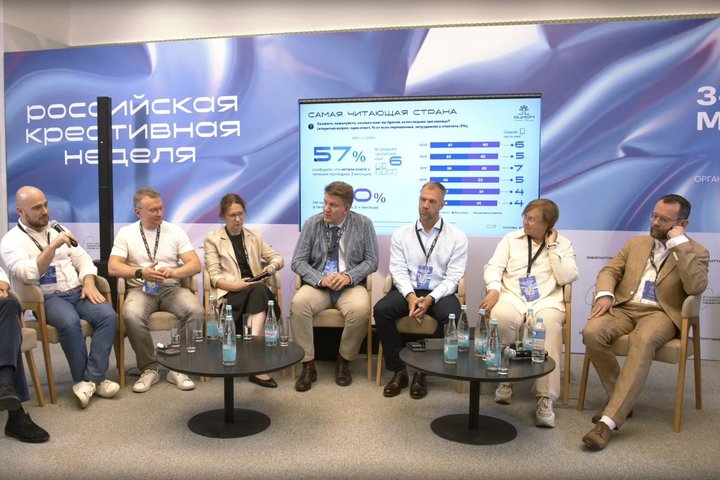Will books be able to replace Netflix?
Book consumption in the country was discussed at the Russian Creative Week

At the Russian Creative Week, which took place from July 3 to 5 in Moscow, VTSIOM presented data on the dynamics of consumption and reading of books over the past twelve years. In short, people began to read more. But the approach to reading has changed.
The book has become more accessible
According to a VTsIOM survey, 57% of Russians have read books in the last three months in 2023. This is an absolute record when compared with previous periods. For comparison, in 2011, when a similar study was conducted for the first time, only 44% read. But the dynamics is jumping in terms of the number of books, although in 2023 (six books) more people read than in 2022 (five books). Most of them were read in 2017, when the average number of books read in three months was seven. But there are also alarming figures. In three months in 2023, 40% of the respondents had never picked up a book.
Evgeny Kapyev, CEO of Eksmo Publishing House, connects the dynamics of the growth in the number of readers with the development of marketplaces and digital book services.
“Previously, literature could only be bought in a bookstore. But there were towns, villages and settlement where there were practically no bookstores, and the assortment was limited. Marketplaces have given access to a huge number of books to residents of remote corners of our country," Kapyev said.

Alexander Brychkin, the director general of the Chitay-Bukvoed united retail chain, attributes the growth of the reading audience to the emergence of new formats that involve shorter reading time or combining reading with other activities.
“These are all kinds of graphic novels: comics, manga, manhwa, mannhua, etc. We see that the share of these genres on sale is growing and today reaches almost 10-12%. This means that there is a growing generation that consumes more of this content in pieces. While the second story is audiobooks, which people listen to when it is impossible to read paper books. Audiobooks fill the time when a person drives a car, plays sports, walks, that is, does something else. And this is an additional consumption, which probably affects the statistics," Brychkin said.
The book is like a sleeping pill
Speaking of formats. According to VTsIOM, paper books are still in the lead (58%). 35% read from a phone, 20% prefer to read on a computer, 16% — on a tablet, 2% print books (environmentalists would not approve of them). Evgeny Kapyev also noted that the number of hours of e-book consumption has increased over the past year. Sergey Anuryev, CEO of LitRes Group of Companies, attributes the growth of e-book reading to the availability of streaming book sites and the simultaneous rise in subscription prices on video platforms.
“Since 2017, subscriptions to movie services have increased in price. The development of the self-publishing segment and the limited growth rate of subscription prices for electronic and audiobooks have led to that the book as a whole has become much more accessible than it was 6-7 years ago. Moreover, there is no such aggressive promotional campaign on the part of the “substitute” to promote new TV series and films," Anuryev added.

In 2023, they most often read for self-development and to learn something new (66%). 54% of the respondents read for pleasure and entertainment. They also got acquainted with the book through study or work (25%) to fill their time with something (6%), 3% of respondents used reading as a sleep aid. Sergey Anuryev believes that the main motive for reading is still entertainment. He suggests that books have become an alternative to Netflix, which has left the Russian market.
Alexander Brychkin doubts that the withdrawal of Netflix caused a sharp transition from one type of content to another. He noted that the jump in the number of people reading in Russia occurred between 2014 and 2017. Then the number of readers increased by 10%. Then there was growth, but not so significant. Brychkin suggested recalling exactly what events took place in the country, which eventually led to an increase in the reading audience. Tatyana Gorskaya, the president of the AST-Azbuka publishing group, recalled these events.
“We started a project to promote reading. I must say that when we started, I didn't believe in it. Then there were the first steps to work with bloggers. But in fact, we, the publishers, for the first time began to communicate directly with our readers. Not through the store and not through wholesalers. We began to talk about books on social networks, what awaits the reader in a particular work," Gorskaya said.
The book is an artifact for young people
Konstantin Abramov, the director general of VTSIOM Foundation, noted that most of the books (seven) are read by people aged 45 to 59 years. But this is not the largest reading group. Roughly speaking, if a person 45-59 years old reads, then he or she reads a lot. But there are few readers in this age group. But the majority of readers (87%) are among young people aged 18-24 years.

Despite that the respondents named self-development as the main purpose of reading, fiction is in the first place in popularity (61%). It is followed by specialty books (33%), non-fiction (31%), philosophical literature and cookery books (12% each), as well as religious literature (7%).
Evgeny Kapyev linked the largest reading audience (youth) and the best-selling category (fiction) with the popularity of Young Adult books.
“Young Adult is one of the largest and fastest growing categories. Now every self-respecting publishing house has an imprint with Young Adult literature. There is an interesting point in the VTSIOM data. If the age audience reads more, they buy less. And the beauty of young people is also that they read a lot and buy a lot. According to our data, young people love a paper book, and this is salvation for all publishers. For them, it's not just a book, it's an artifact," Evgeny Kapyev summed up.
VTSIOM, of course, does not have data for 2024 yet. But the participants in the discussion are already waiting for statistics, because they assume changes in the breakdowns. Good or bad, they didn't say.
Ekaterina Petrova — literary reviewer of Realnoe Vremya online newsppaer, author of Poppy Seed Muffins (Булочки с маком) telegram channel, and founder of the first online subscription book club Makulatura.